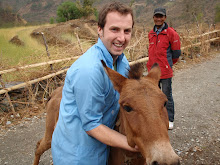On the technical side of things, we have just completed the 2 day shed management training course in all 16 groups. The participants learned about basic concepts of drainage and ventilation, as well as floor space requirements. They learned about different types of housing and which is best suited to their situation. They also discussed what improvements could be made to their existing sheds.
The second day of training was spent in the field visiting other group members' homes and evaluating their goat and buffalo sheds. This included taking measurements, assessing drainage and air flow through the vents. Upon completion, they discussed their findings and compared them to the "Ideal Shed", of which VIVA has funded one in each group. This is the perfect design on which their own sheds should be based.
An interesting thing to come across was how many cases there have been of leopards taking goats from their sheds during the night. This was borne into the design of the Ideal Shed. Our field staff got their first taste of training a big group on their own and it proved a great experience and confidence booster.
Wednesday, February 25, 2009
Monday, February 16, 2009
Gender Awareness
As in the majority of countries around the world, particularly the Global South, it is women who are most involved in food production. In Nepal, 80% of all agricultural work is done by the women of the family. This, along with the preparation of the food, rearing the children and running the household is very demanding. So, from field to fork, it is the women that feed the nation. But in a male dominated world, women rarely get chance to voice their opinions and in a lot of cases, possibly owing to the Hindu culture, they just passively accept their place in the background.
The CLPSP project has a strong social component to its training. As well as empowering women with technical education, through our recent Gender Awareness Training, all the women's groups discussed their role in society. We aimed to help them see just how important a role they play, but this was to happen through self realization. These trainings are inclusive of all castes in the community.
To be robbed of an identity through poverty is a most degrading feeling. We hope to give these women back the recognition they deserve.
The CLPSP project has a strong social component to its training. As well as empowering women with technical education, through our recent Gender Awareness Training, all the women's groups discussed their role in society. We aimed to help them see just how important a role they play, but this was to happen through self realization. These trainings are inclusive of all castes in the community.
To be robbed of an identity through poverty is a most degrading feeling. We hope to give these women back the recognition they deserve.
Thursday, February 5, 2009
In search of the Mighty Boer
In Nepal, goat meat or mutton is the most common form of red meat, seeing as beef is off limits. The dairy goat industry is relatively non existant and meat goats predominate. The local breeds of goat are hardy creatures but not very productive in terms of feed conversion. One of the aims of our project is to improve the standard goat by crossing with improved breeds, inreasing the productivity of the livestock and ultimately the income of the farmer.
To do this VIVA Nepal needs good quality goats and especially breeding bucks. The Boer goat, originating from South Africa, is the gold standard in goat meat production and we have been trying to locate bucks in Nepal that have some boer lineage. But this is proving to be both difficult and tiring.....as it includes alot of trekking!
Our thinking now is, if we can't find them - breed them! We hope to purchase a pure bred Boer buck and cross him with local does to produce a hardy cross, suitable for the mountains of Nepal. Now all we have to do is find him!!!!!!
Log on to www.viva.ie to see if you can help VIVA Nepal.
To do this VIVA Nepal needs good quality goats and especially breeding bucks. The Boer goat, originating from South Africa, is the gold standard in goat meat production and we have been trying to locate bucks in Nepal that have some boer lineage. But this is proving to be both difficult and tiring.....as it includes alot of trekking!
Our thinking now is, if we can't find them - breed them! We hope to purchase a pure bred Boer buck and cross him with local does to produce a hardy cross, suitable for the mountains of Nepal. Now all we have to do is find him!!!!!!
Log on to www.viva.ie to see if you can help VIVA Nepal.
Subscribe to:
Posts (Atom)



























